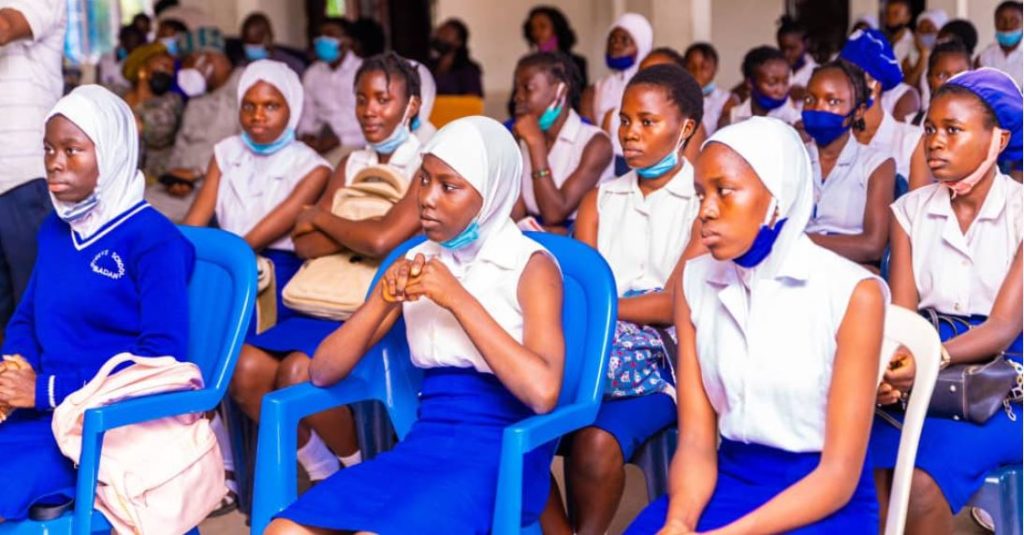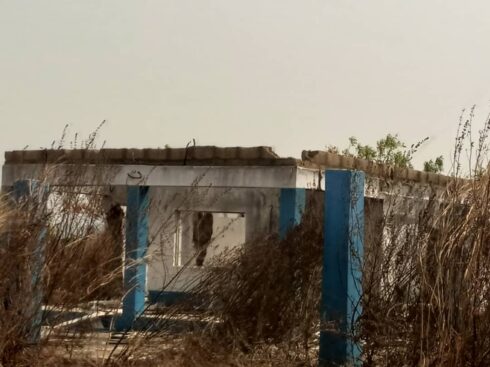Inside Girl child education in Oyo
In this report, our correspondent investigated how farming activities, poverty, religious beliefs and early marriage have put the girl-child education on the edge in some Oyo State communities. Like every ambitious young lady, 17-year-old Azeezat (not real name) born into a polygamous family in the rustic Kisi community, the northern part of Oyo State, wants […]

In this report, our correspondent investigated how farming activities, poverty, religious beliefs and early marriage have put the girl-child education on the edge in some Oyo State communities.
Like every ambitious young lady, 17-year-old Azeezat (not real name) born into a polygamous family in the rustic Kisi community, the northern part of Oyo State, wants to become a nurse so that she could save lives.
But the dreams of the final year science student of the Novelty Academy, Kisi in Irepo Local Government Area, is battling storms. Her father, who is a welder and farmer, wants her to get married upon completion of the Senior Secondary School Examination (SSCE).
Why? The father of 10 isn’t a fan of girl-child education, hence, he is not ready to fund the young girl’s education beyond SSCE.
Court jails corps member, 38 others for internet fraud in Ogun, Oyo
Oyo, Rivers’ Judiciaries Move To Establish Small Claims Court
“He has not told me directly, but my mum is aware,” the hapless girl told this reporter, adding that “His (the father’s) attitude towards the girl child education is negative and I feel bad because he wants to kill my goal.”
She said apart from her father’s negative attitude to girl-child education he’s being influenced by his peers. ”
My father and his friends usually discuss under the mango tree that female students usually misbehave while on campus,” she said.
The young girl, however, seems undeterred, saying “I will work hard to further my studies since I have the knowledge of tailoring.”
Azeezat is not alone in the community as thousands of young girls in the community have had their dreams cut short due to their fathers’ indisposition to the girl-child education. To them, an investment in a girl-child education “is a waste as she would end up in her husband’s house.”
“In the olden days in Kisi, vast majority of families did not enroll their daughters in school. They did not see any value for it as a waste.
“But things are now changing, every family now sees pride in girl-child education. Although, there is still some exceptions. Some sects like Mokondoros still don’t enroll their female wards in schools. They don’t believe in western education. However, their girls are exposed to Islamic education,” an indigene of Kisi and mother of two, Raimot Ahmad told our correspondent.
GIRL-CHILD EDUCATION IN OYO STATE
In October 2019 during the first celebration of the International Day of the Girl Child under Governor Seyi Makinde’s watch, the Secretary to the Government of Oyo State (SSG), Mrs. Olubamiwo Adeosun harped on the government’s commitment on girl-child education because “education is one of the pillars of the administration.”
“When we say that education is one of the pillars of this administration; it is very clear, because education sure makes a complete difference in the lives of people, even the generation to come. And we knew that if we want to make our difference in the history of Oyo State, then education is key.
“You also know that when we talk about the number of girl-children, it is almost equal if not more than that of the boys, so if you do not invest in the girl-children you are missing out on so much value on the children,” Adeosun said.
She added that “But we should not just let the celebration of the girl-child end with the International Day celebration; let us continue to invest in the girl-child so that these children we are seeing here today will become leaders of tomorrow and not just leaders, but good leaders because we have invested in them all.”
In December 2020, the National Education Data Survey (NEDS) conducted by the National Population Commission (NPC) revealed that 12 percent of children of school going age in Oyo State were still out-of-school. The data captured both male and female children.
But despite the staggering data, the state government boasted that it had been able to bring 40,000 children back to school.
However, UNICEF’s 2021 Multiple Indicator Cluster Survey (MICS-6) indicates that 16.3 percent of female children are out of senior and junior secondary school in Oyo State. Also, 14.9 percent of the population (3 years and above) of both male and female have never attended formal education in the state.
Findings by Daily Trust revealed that, poverty, pregnancy, child labour, child marriage and religious beliefs are some of the factors militating against girl-child education in Kisi and other parts of Oyo State.
CHILD MARRIAGE, FEMALE GENDER MUTILATION…
Section 23 and 24 of Oyo State Child Rights Law prohibits child marriage and betrothal. Under the law, a child is said to be a person under 18 years and as such “is incapable of contracting a valid marriage.”
Yet, the child marriage which is rampant in many Oyo State communities has had adverse effects on girl-child education, findings by Daily Trust showed.
UNICEF’s 2021 Multiple Indicator Cluster Survey (MICS-6) revealed that 3.4 percent girls married before 15 years, while 13.2 percent married before 18 years in Oyo State.
Apart from child marriage, girls in the state also suffer human rights violation like rape and Female Gender Mutilation (FGM). In Oyo, 43.2 percentage of women who had any form of FGM, the UNICEF report indicated.
22 NOMADIC SCHOOLS SHUT IN OYO’S IBARAPALAND

In the Ibarapa area of Oyo State, findings by our correspondent showed that at least 22 nomadic schools have been closed down, leaving thousands of nomadic children roaming the streets.
The affected 22 schools spread across Ayete, Tapa and Igangan in Ibarapa North Local Government Area of the state.
Investigation by our correspondent revealed that the schools were shut down following the farmers-herders’ clash which resulted in the eviction of Fulani in the area.
In January 2021, the Sarkin Fulani of Oyo State residing in Igangan community and other Fulanis were evicted last year after a one-week ultimatum given by the Yoruba nation agitator, Sunday (Igboho) Adeyemo.
The eviction of Fulani residents in Igangan was the climax of the age-long farmers-herders’ confrontation which has triggered suspicion among the Fulani and Yoruba residents.
But one of the aftermaths of the eviction was the disruption of the education of thousands of nomadic children who are now stranded owing to the closure of 22 schools in Ibarapa North.
It was gathered that not less than 65 teachers of the 22 nomadic schools are currently wondering about, awaiting new posting from the state Universal Basic Education Board (SUBEB).
According to UNICEF’s 2021 Multiple Indicator Cluster Survey (MICS-6), 34.9 percent of the school children (age 7-14 years) were not able to attend class due to absence of teachers or school closure, last year, in Oyo State.
However, the number of female children affected in the nomadic school’s closure in Ibarapaland could not be ascertained by our correspondent.
FARMING KEEPS GIRLS OUT OF SCHOOLS

In Ogbomosho and some of the adjoining communities, farming activities have dealt huge blows on girl-child education.
With major focus on cashew, groundnut and tomatoes, Iresa-Adu, Iresa-Apa, Onikeke,
Fasina, Gbena, Baasa amongst others in Surulere Local Government Area of the state, are homes to commercial farmers. The council was part of the former Ogbomoso Local Government.
A teacher in one of the public secondary schools in Ogbomoso North Local government area of Oyo State, told Daily Trust that students are always engaged to work on farms, picking cashew or working as labourers in warehouses used for storing cashew. This, the teacher said, always affects education of the students in the area most especially the female.
“During the last WAEC registration, we needed to go to the houses of some students who had stopped coming to school to plead with them to come register for their WAEC examination.
“We discovered that two of the girls were pregnant and that was why they stopped coming to school, but we still registered them.
“Things like these are very common in schools in Ogbomoso. But there are a lot of factors responsible for it.
“One of the reasons for this is poverty. From our interactions with students, we have discovered that some of the students are the ones fending for themselves. They engage in different menial jobs to take care of themselves and this is a big distraction for their education.
“Some of them, especially the boys engage in produce activities, especially during the cashew season, you know Ogbomoso is known for cashew nuts production.
“During the cashew season, we always record low attendance of students in school. Cashew is a big business here and the students are either always working on farms, picking cashew or working as labourers in warehouses used for storing cashew.
“Some of them earn a reasonable amount of money and they tend to give up on school, while others don’t take their education seriously”, she said.
She added that, majority of the students combine schooling with learning of skills and this, according to her, makes learning difficult for them.
“We have also discovered that many students have other things to do apart from schooling. For instance, some of them combine schooling with learning of skills and eventually, some may stop coming to school.”
In Arulogun Oja town, Ibadan, the Baale, Chief Lawal Taofik Arulogun told Daily Trust that some parents are in the habit of engaging their daughters in hawking and farming at the detriment of their education.
“I discovered that girls who are in JSS 3 to SS3 are most affected,” Arulogun said.
He admitted that some “some parents don’t believe in educating their girl-children as they see it as a waste of resources.”
“When I ascended the throne, I called the meeting of all the villagers that are under the control of Arulogun Oja with the support of chief Monsur Arulogun, the Mogaji Arulogun and others in the Arulogun Royal family where a standing order was given that no child of school age should be seen on market day hawking and they obeyed,” he added.
The Baale also blamed inadequate teachers and infrastructural decay for students’ disinterestedness in schooling.
“If you don’t have enough teachers in the rural areas and the ones available won’t come to school on time, many parents would explore that and say ‘your teacher won’t come on time, go and hawk before going to school,” he said.
‘GIRL-CHILD EDUCATION NEEDS CARROT AND STICK APPROACH’
An advocate of girl-child education, Ms Enitan Sophie Oluwa identified “lack of resources exacerbated by poverty and patriarchal values” as one of the factors militating the education of girls.
“Stigma is another great factor militating against girl child education. I mean a society heavy on religion, culture and other factors that makes a girl child gets discriminated against and seen as less important. Many girls are being denied access to schooling and education on the grounds of being female and seen as the gender that would be married off which makes the investment one without Returns.
“Societal expectation from the girl child based on her biological functions tends to dictate a lot as regards the kind of educational empowerment a girl child would get,” Oluwa who is the Chief Responsibility Officer at Natineee Empowerment for Sustainable Initiative (NESII), said.
She submitted that “the girl child education hasn’t totally gotten the attention it needs but over the years more energy has been put there and many more efforts would yield results in coming years.”
Going forward, Oluwa said “I believe in the carrot and stick method where people are enlightened and encouraged to send their daughters to school. With the many government policies neatly carved on papers with little actions in reality.
“One of the radical ways for me is encouraging people to have only the number of children they can cater to. Enforcing laws when they get violated will also send a strong signal to other people on how serious the government is.
“When we say the girl-child education is threatened, I think we need to imagine the fate of Girls with Disabilities. This feels like double jeopardy and I know we have to act fast to ensure every child regardless of their disability status gets the education they require to live a fulfilling life.”
An Ibadan ex-banker, Rufus Adebolu Idowu argued that most of the parents who are not subscribed to the girl-child education “were probably not well trained themselves.”
“When you have children, whether male or female, they are both supposed to be trained adequately to the level where they can be independent,” Idowu opined.
To the Baale of Arulogun Oja Town, “Government should do more door-to-door campaigns on the importance of educating a girl child. If they can do it when campaigning for election then nothing stops them from doing it.”
‘ISLAM PRIORITIZE GIRL-CHILD EDUCATION’

An Ilorin-based Islamic scholar, Sambo Fatiu told Daily Trust that “In Islam, the education of the girl child is treated with utmost importance and Islam made provision for the rights of the women whether as a girl child, wife, sister or mother.”
He cited examples of Maryam Aloma Muktar, former Chief Justice of Nigeria and Zainab Ahamad, the current minister of finance, Zainab Ahmad, as good examples of female northerners who got western education.
“It is even surprising that the two women I mentioned are from the core North, where rumour has it that the girl child education is not valued,” Fatiu said.
The Islamic scholar also admitted that some Muslims “still refuse their girl child access to basic education, but it is very minimal.”
“As for South West Nigeria, it is true that we have some Muslims who still refuse their girl child access to basic education, but it is very minimal. The reason for this is not far-fetched. It is as a result of the bias from some quarters who deny our girls the right to use their Hijab. This is common in all states in the southwest, Oyo, Lagos and Ogun state inclusive. Until recently when the supreme Court affirmed that the girl child has a right to her hijab, whether in school or at home.
“Even after the judgement, some quarters are yet to comply. The Muslims want their daughters in school but not at the detriment of their religious beliefs.
“In government owned schools, let there be freedom of religion. They are minors, allowing them to practice the religion of their parents without discrimination. When this is done, no girl child will be left at home. Our daughters cover their heads, not their brains,” Fatiu said.
GOVERNMENT’S SILENCE
Several efforts to get comments from the officials of the state government proved abortive. For three days, the Commissioner for Education, Science and Technology,
Abdulrahman Abdulraheem, could not be reached via his mobile phone.
Also, the Chairman of SUBEB, Dr Nureni Adeniran, did not pick several calls put across to his mobile phone and failed to respond to a text message sent to him.
